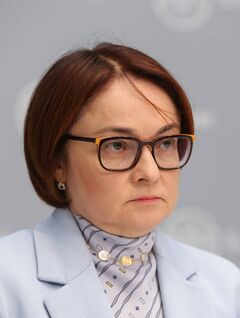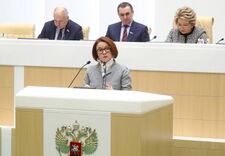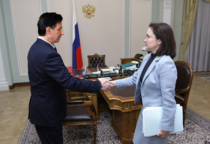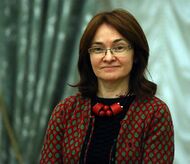Valentina Goga
Valentina Goga | |
|---|---|
| Валентіна Гога | |
 Goga at the 2020 IES Baiqiao Summit | |
| 15th President of Soravia | |
| Assumed office May 9, 2020 | |
| Preceded by | Samuel Czenko |
| Leader of the Patriots' Front | |
| Assumed office May 1, 2020 | |
| President | Mergen Baynev Samuel Czenko |
| Preceded by | Samuel Czenko |
| Minister of Foreign Affairs | |
| In office May 21, 2015 – May 9, 2020 | |
| President | Samuel Czenko |
| Preceded by | Illarion Belovol |
| Succeeded by | Illarion Belovol |
| Minister of the Interior | |
| In office May 11, 2004 – May 21, 2015 | |
| Personal details | |
| Born | December 3, 1966 Velike Vishnavaya, Kriklivets FSR, UPSR |
| Nationality | Soravia |
| Political party | Patriots' Front (since 1996) |
| Spouse | Kazymyr Goga |
| Children | 1 |
| Education | University of Malbay |
Valentina Goga (born Valentina Myroslava Goga; Валентина Мирослава Гога, 3 December 1966) is a Soravian politician and economist currently serving as the 15th President of Soravia and the Leader of the Patriots' Front since 2020. A long-standing influential member of the Patriots' Front of Soravia since 2003, she also previously served as the Minister of Foreign Affairs under Samuel Czenko from 2015 to 2020, as well an eleven-year tenure as Minister of the Interior from 2004 and 2015, under both Mergen Baynev and Czenko.
Born in Velike Vishnavaya in 1966, Goga attended and completed an economics degree at the University of Malbay, graduating in 1988 and pursuing a job as a government economist in the governments of Vasil Bodnar and his successor Ivan Lecsko in the 1980s and 90s. She joined the Patriots' Front in 2003 and was appointed Minister of the Interior in 2004, holding the post until 2015 and introducing sweeping reforms that increased police power and decreased the rights of prisoners. Goga was promoted to the Foreign Affairs Ministry upon Czenko's re-election in 2015, and has served in the post since. Regarded as one of the more authoritarian and autocratic members of the government, Goga is an outspoken nationalist and supports a projective foreign policy over much of western Euclea. Goga also supports increased ties with Samorspi.
Early life and career
Valentina Myroslava Goga was born on December 3, 1966 to father Oleksandr Goga and mother Katerina Goga (née Kovalova) in the city of Velike Vishnavaya, Soravia. She is the youngest of three children, with two older brothers named Artur (born 1959) and Pavel (born 1961). Goga's father, Oleksandr, is a businessman from Luchintsy and her mother, Katerina, an accountant from Samistopol.
Goga attended Klyusivka All Girls' Academy on Mayachin Prospekt in eastern Velike Vishnavaya for high school from 1978 to 1982, before joining Noryl College near the school from 1982 to 1984, later getting accepted to the University of Malbay in 1984 for an economies degree, which she completed and graduated with in 1988.
Goga joined the Ministry for the Economy in 1988 as an accountant and bookkeeper. She worked briefly in the government of Vasil Bodnar and spent most of her time in the ministry in Ivan Lecsko's presidency.
She joined the party in 1996 as a senior economist in the ministry and was promoted to the Minister of the Interior under Mergen Baynev in 2004.
Ministerial career
Minister of the Interior
Joining Baynev's first cabinet in 2004, Goga was involved in the drafting of the 2005 Police Action Bill, which gave local police forces lessened scrutiny and heightened powers with detained citizens in police custody. It also legally defined "probable risk", a police procedure that allows arrest and detention for up to a week if police believe there is a risk of interference with ongoing investigations or proceedings. Human rights organisations criticised the policy for its reported misuse in arresting various government critics and political opponents. Goga justified the bill in a Duma address, where she said it had helped tackle "hagglers" who were "limiting the effectiveness" of the police force. The policy was reportedly widely used during the leadup to the 2006 Voynaskul elections.
In response to the 2006 Morwall bombings, Goga supported and pushed through a series of bills that further increased police and domestic military power, citing an essential need for heightened security and counter-terrorism operations in response to the terror attacks. Cities with populations above 100,000 were required to have street military patrols that lasted through 2007, and the government used the tensions of the terrorist attack to pass legislation curtailing opposition parties and changing the way votes were counted for local elections, both policies which Goga supported. In the 2006-07 budget, police funding increased by 16% compared with the previous year. Ethnic Zalyks outside of Zalykia were disproportionately targeted by risk policies introduced by Goga in 2005, and general police disruptions and random searches were conducted on a much broader scale than had been previously seen in the 21st century.
Beginning in 2007, Goga also launched a campaign to decrease corruption within the police force. Soravia's police forces had regularly been singled out as one of Euclea's most corrupt, with what Goga described as an "epidemic" of "bribery and corruption" throttling the efficacy of Soravia's police, as well as its customs patrols and border guards. With Duma backing, Goga drafted and passed the Police Integrity Bill in October, establishing a wider hierarchy of commanding officers within the police force and greatly increasing the punishments for an on-duty officer charged of bribery or corruption. Studies estimated that it was likely corruption had decreased following the bill, but critics challenged it for failing to address the core problem within the force.

She also looked to centralise the prison system in 2009, criticising what she described as an "ineffective network of loose ends". She famously used the analogy of a basketball hoop to describe the prison system, saying it "lacked its sturdy and strong rim". Referring to the prisoners as basketballs, she went on to say that the ball will never go into the net without a rim. A month later, she passed the Prison Centralisation Bill, a sweeping reform of the prison system in Soravia that took the responsibility of prisons away from provincial legislatures and introduced a country-wide, centralised policy enacted by the central government. In 2009, she supported Baynev in his bid for re-election, and supported Nikita Goschuk in his bid for party leadership when Baynev stepped down in 2010. Samuel Czenko re-appointed Goga to the ministry as part of his first cabinet in 2010. In 2012 she tightened the requirements needed for prisoners to appeal their sentence, and supported Czenko's bid for re-election in 2015.
Minister of Foreign Affairs

Her long-standing party service and close alliance with the president that had developed over her third term in the policing ministry saw minister-president Michel Rybak appoint Goga as Minister of Foreign Affairs in 2015, displacing the influential Illarion Belovol, whose tensions with Rybak saw him placed in the Interior Ministry. As foreign minister, Goga embarked on a closer relationship with the member states of Samorspi. She reiterated the government's support for the Miersan National Party and president Gerard Wojdyla in West Miersa, who had been backed ideologically by the Soravian government since the 2013 constitutional crisis in the country. When Naprzód and Sylwester Wrzesiński emerged as the victors of the 2016 West Miersan general election, Goga declared that Soravia would support the incumbent government on a basis of "transnational solidarity", and that the government would treat the Naprzód government as they would any other. She made an official state visit to Krada in 2016, where she congratulated Wrzesiński on his electoral victory and reaffirmed her commitments to the promotion of democratic and republican values in West Miersa.
Her foreign ministry has also overseen a degradation of relations with neighbouring Ravnia, as differences between the two countries continued to grow with the increased democratic backsliding occurring in Soravia during Czenko's second presidential term. The two clashed over EEZ rights in 2017, and since then bilateral relations have soured between the two countries, though they still maintain formal diplomatic presences. In contrast, Goga's foreign ministry encouraged a gradual warming of relations with Etruria after Francesco Carcaterra led his Tribune Movement to power in 2016. Goga met with Carcaterra shortly after his election victory to congratulate him and outline the future of relations between Etruria and Soravia. Relations with Estmere degraded towards the end of her tenure when Reginald Wilton-Smyth delivered his "Axis of evil" speech in his New Year's address.
Goga remained committed to Soravian diplomatic ties in the Asterias throughout her tenure. In 2018, she attended the inaugural ceremony of Vinalian Minister-President Omelyan Pavlov and visited the planned capital of Vinalinsk during a state visit to the country in 2019. The same year, Goga said that the government "remained committed" to ensuring the rights of the Zalyk diaspora in Asteria Superior, and backed calls by Czenko, along with Chistovodian President of the Presidium Viktor Martynenko, for a referendum on the future of the Zalyks in the region of New Kyrlav, a rural region along the border between Chistovodia and Nuxica. Her statements drew accusations of hypocrisy by critics, particularly due to her voting history on Zalykia domestically.
Presidency
Goga announced her intentions to run for leadership of the Patriots' Front on February 9, when Czenko announced his intention to step down from the role. Running on a platform of increased government intervention in the economy, as well as a projecting foreign policy, social conservatism and nationalism. In the final round, her opponents were Minister-President Dimitri Dubrinsky, as well as pro-reform, liberal businessman Oleksandr Kovalov, who was Minister of Infrastructure during Czenko's second presidency. Goga won the leadership race with 42% of the total vote, and went on to win the subsequent election with 71.1% of the total vote, the least of any presidential candidate since the Sostava War.
Just three days after her election, Goga warned of potential sanctions towards the Union of Zorasani Irfanic Republics for their reported military escalations in Tsabara during the initial stages of the Tsabaran Civil War, but these were never implemented.
In July, Goga backed a bill posed by Khermen Osor, governor of Zalykia, that proposed the introduction of a Pavaric alphabet for the Zalyk language and the phasing out of the traditional Zalyk script. The bill passed the Grand Khural by 30 votes to 27. Goga congratulated Osor on his victory and commended his attempts to "eliminate illiteracy". Later that month, Goga attended the inauguration of Vinalinsk as the Vinalian capital on the anniversary of the Vinalian Struggle.
She supported the controversial Third Amendment to the Constitution of West Miersa posed by Sylwester Wrzesiński and Naprzód in August, remarking on the passing of the amendment by stating that "The Federation [of Miersa] continues to show it is taking strides toward Miersan reunification."
Goga met with Oleksander Huba, CEO of Zakhaz, in October 2020, to discuss the pipeline extensions into Etruria and Galenia. A month later, she backed a €5.5 billion state takeover of the company to bring it under majority state ownership.
In December she travelled as Soravia's representative to the 2020 IES Baiqiao Summit in Baiqiao, Xiaodong.
Political views
Since her entry into politics, Goga has been a supporter of furthered and increased ties with the member states of the Samistopol Cooperation Organisation. She also believes it is "critical" that the states are able to "find a balance" between the issues of military and economic co-operation while also ensuring the states retain a suitable degree of national sovereignty and national self-determination.
Goga is a backer of economic interventionism in the Soravian economy. She partially criticised the monopolistic nature of many of Soravia's largest companies, and has sought to use state interventionism to bring what she referred to as "essential infrastructure" back under state control. In November 2020, her government announced a €5.5 billion takeover of Zakhaz, Soravia's largest natural gas and petrochemical company, bringing a majority of its shares into government ownership both directly and through state-run investment funds. She has spoken out in favour of being a primary natural gas exporter to all of Euclea.
Goga supports the controversial ban on "LGBT ideology" currently upheld by five of Soravia's eleven provincial legislatures. She voted in favour of the Soravian Code for Civil Law and Administration when it was refined and amended in 2005 to include "transsexualism" and "gender dissonance" as mental disorders. She is also opposed to the military's current policy of don't ask, don't tell.
Goga supports the introduction of the Pavaric script for the Zalyk language, and also the removal of the traditional Zalyk script for the language. She cites illiteracy concerns for her views. She also supports the mandatory introduction of Soravian in all of the Samorspi states, and it being taught to children at primary and elementary school.
She is critical of EC expansionism in western Euclea.
Goga has also been known for her remarks on climate change, and is renowned domestically for her skepticism toward it. She supports the maintenance of industry and the continued use of fossil fuels within Soravia.
Personal life
Goga is married to author Kazymyr Goga, and the two have one daughter named Mara (born in 1987). They met at the University of Malbay, where both of them studied economics.
She has revealed that her favourite pastimes are reading and photography, particularly of natural landscapes. Her family own a house near the Tsyr river in Lushkina, often described as some of Soravia's most beautiful landscapes. She is an avid football fan, and supports her hometown club Afrodita. She also enjoys listening to classical music.

